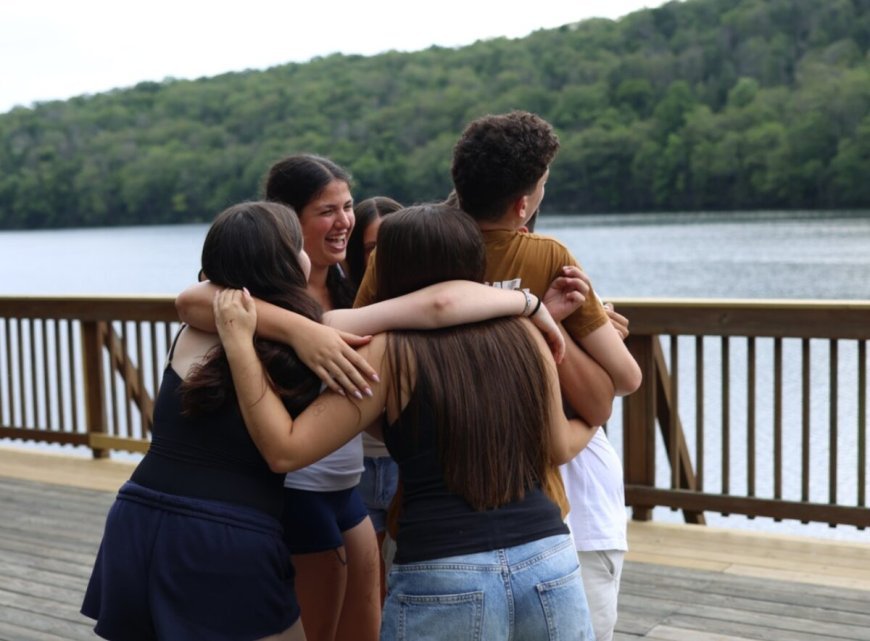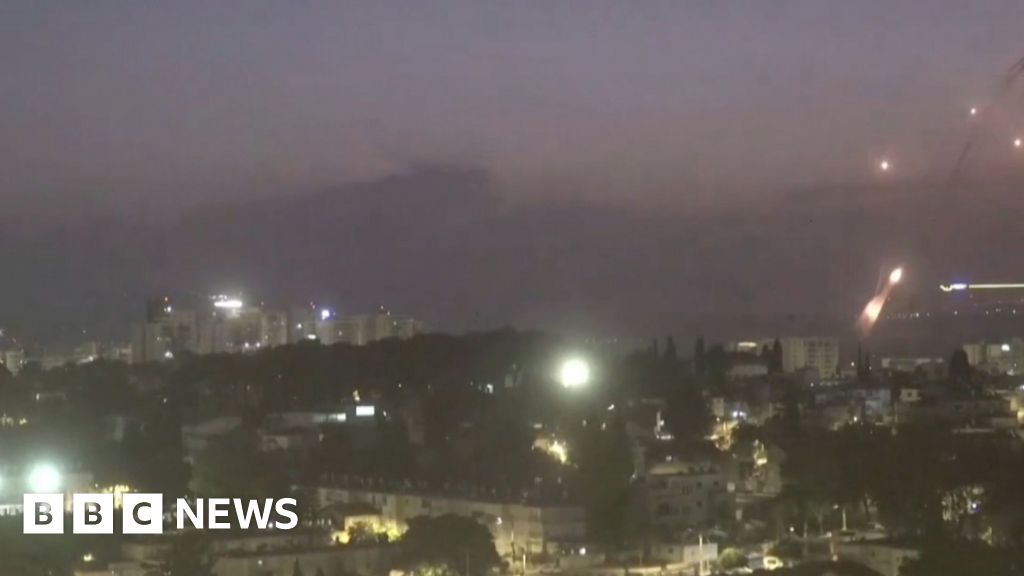Bringing displaced Israeli kids to U.S. camps, Jewish Agency offers a ‘happy summer’ and peoplehood
Before this summer, Michael Schlank thought the closest he’d get to understanding the trauma caused by Hamas’ Oct. 7 terrorist attacks was a November visit to Kibbutz Kfar Aza where he witnessed “the smells and sounds of war” the CEO of New Jersey Y camps told eJewishPhilanthropy. Then for two weeks in August, NJY brought... Read More

 Before this summer, Michael Schlank thought the closest he’d get to understanding the trauma caused by Hamas’ Oct. 7 terrorist attacks was a November visit to Kibbutz Kfar Aza where he witnessed “the smells and sounds of war” the CEO of New Jersey Y camps told eJewishPhilanthropy.
Before this summer, Michael Schlank thought the closest he’d get to understanding the trauma caused by Hamas’ Oct. 7 terrorist attacks was a November visit to Kibbutz Kfar Aza where he witnessed “the smells and sounds of war” the CEO of New Jersey Y camps told eJewishPhilanthropy.Then for two weeks in August, NJY brought more than 100 Israeli teenagers between the ages of 14 and 16 who have been displaced from their Gaza border and northern Israel homes to its Milford, PA campus to experience the American pastime of sleepaway camp. Hundreds of Israeli teenagers, many dealing with significant anxiety and the lingering effects of trauma caused by Oct. 7 and its aftereffects — including some with family members who were kidnapped to Gaza or murdered by Hamas — took part in similar programs at 30 summer camps around the United States through a Jewish Agency for Israel program, called Campers2Gether, which is subsidized by more than $7 million from the Jewish Agency and partners.
“Spending time with these kids, watching them both enjoy themselves, as well as struggle with challenges, was gratifying in a way that is almost indescribable,” Schlank said. “I’ll never forget seeing Kfar Aza, but I’ll also never forget sitting next to a young boy outside of an event because the music was too loud for him. Tears streamed down his face because he wanted to go back in but felt he couldn’t. It’s both happy and sad at the same time.”
NJY is the largest Jewish camping group in the U.S. with 3,000 campers per year on five campuses in the Poconos. Unlike the other 29 participating camps, where Israeli kids took part in camp simultaneously with American campers, because of the large size of NJY’s delegation, the program was held after the traditional camp sessions ended. This allowed the teenagers to also participate in some unconventional camp activities such as attending the Broadway show “Hamilton” and a New York Mets game. Instead of Campers2Gether, the NJY program also went by a different name, Machane Am Echad (One People Camp).
“Campers2Gether has two main goals,” said Shelley Kedar, director of the Jewish Agency’s Connecting the Jewish People Unit, whose role spearheading the initiative included a variety of logistics such as booking flights, helping kids who had never before left the country obtain passports and running preparation seminars for the teens and their parents. “Goal one is about resilience; taking teens out of a war-zone, literally, and giving them a happy summer. The second is to connect: to create a sense of peoplehood and community between teens in Israel and teens around the world and make sure that each side knows they are not alone,” Kedar told eJP. “We got really good results from those goals.”
 Participants in the Campers2Gether program from the Gaza border area at Camp Ramah in the Berkshires in the summer of 2024. (Jen Roman/Jewish Agency)
While the Jewish Agency was the main funder of the initiative, Kedar said that “it takes a whole village to make this project come together,” noting that partnerships included Mosaic Teens, local federations, private foundations and the willingness and ability of participating camps to cut their thousands-of-dollars tuition in half. Another key player in the “village,” Kedar said, was the trust in the Jewish Agency of each Israeli municipality that sent a delegation of their kids. “In Israel, camp is three or four days and not until 11th grade,” she said. “To send a kid abroad for two weeks, especially in a war, is —culturally —just not a thing.”
Participants in the Campers2Gether program from the Gaza border area at Camp Ramah in the Berkshires in the summer of 2024. (Jen Roman/Jewish Agency)
While the Jewish Agency was the main funder of the initiative, Kedar said that “it takes a whole village to make this project come together,” noting that partnerships included Mosaic Teens, local federations, private foundations and the willingness and ability of participating camps to cut their thousands-of-dollars tuition in half. Another key player in the “village,” Kedar said, was the trust in the Jewish Agency of each Israeli municipality that sent a delegation of their kids. “In Israel, camp is three or four days and not until 11th grade,” she said. “To send a kid abroad for two weeks, especially in a war, is —culturally —just not a thing.”But the kids seemingly adapted to a new culture quickly. The program wrapped in mid-August and Kedar said that now back in Israel, the teenagers are still singing camp songs and sporting T-shirts with their camp’s logo. The language barrier, she said, was hardly a problem. “What we’ve learned is everybody speaks ‘soccer.’ Everybody speaks ‘lake.’”
The feedback from the adults who stayed back in Israel was also positive, according to Kedar. “Knowing that their kids were safe for two weeks actually allowed parents to lower their own stress levels,” she said. “We’re also hearing from teachers that the school year is going to begin completely differently because of this summer camp experience… it’s a huge impact that goes beyond summer camp.”
The teenagers were placed at camps together with their classmates and other members of their community, including 10 delegations from the Eshkol region, one of the hardest-hit communities in the Oct. 7 attacks. Because American camps are not readily equipped to deal with trauma-related needs of Israeli kids, each cohort traveled with a mental health professional and an educator from their respective regions. Shlomit Nazar, a 40-something mother of five and a teacher who was displaced from her Gaza envelope home for five-months after Oct. 7 accompanied her students to Camp Ramah in the Berkshires, filling in as a camp counselor for the two-week program.
All of the kids in Nazar’s delegation spent at least 25 hours in a safe room on Oct. 7-8 and many lost family and friends that day. Asked whether it was a difficult choice to leave her own family for two-weeks to take care of her students, Nazar said with a laugh that “actually it wasn’t.”
Immediately upon hearing about the offer from the Jewish Agency, she said she was “excited to feel 15 again,” reflecting on a similar experience she took part in as a teenager and noting the unusualness of being a camp counselor at her age. “Once I got there I realized that I was not actually still 15,” she joked.
 Shlomit Nazar stands outside a bunk at Camp Ramah in the Berkshires in the summer of 2024. (Jen Roman/Jewish Agency)
“But I also needed this,” Nazar said. “I needed to get away from this conflict. What gave me strength was the energy of the kids.”
Shlomit Nazar stands outside a bunk at Camp Ramah in the Berkshires in the summer of 2024. (Jen Roman/Jewish Agency)
“But I also needed this,” Nazar said. “I needed to get away from this conflict. What gave me strength was the energy of the kids.”Twenty of the teens were sent to Camp Hess Kramer in Los Angeles. Jen Shankman, the camp’s director, told eJP that the experience was equally beneficial to the American campers, including her own child, as it was to the Israelis. Already, she said, there have been discussions about bringing the same group of kids back next summer.
“Anybody who has grown up in camp knows that from year to year those connections only get stronger,” Shankman said. “Everybody is keeping in touch with each other. The experience becomes that much more meaningful from year to year as it builds.”
What's Your Reaction?



















